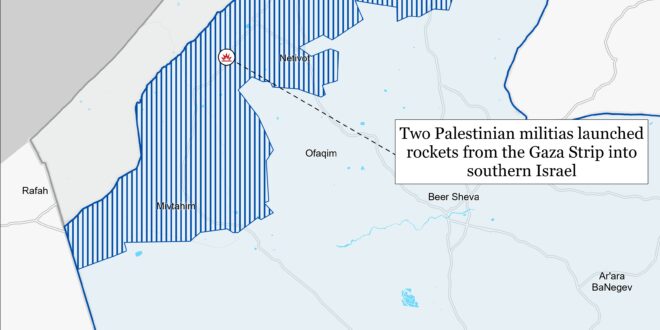Palestinian Islamic Jihad (PIJ) and other Palestinian militias cooperating against Israel have likely established at least one cell in Jenin to target Israeli civilian areas outside of the West Bank. Israeli forces killed a Palestinian man from Jenin carrying a weapon and “ready-to-use explosive device” in Zeita, along the West Bank-Israel barrier, on March 11.[i] The IDF said that the man was en route to conduct a suicide bombing in Tel Aviv.[ii] A PIJ commander in Jenin organized the attack.[iii] PIJ probably received assistance from other Palestinian militias, given PIJ’s role in the Hornets’ Nest operations room and Jenin’s importance as a hub for militia activity. The Hornets’ Nest is a combined operations room that is based in Jenin and led by PIJ, Hamas, and the al Aqsa Martyrs’ Brigade.[iv] The IDF conducted a “brigade operation” in Jenin on March 13 following the attempted March 11 attack and arrested seven “wanted persons” and captured three improvised explosive devices.[v] The IDF Air Force killed the Palestinian commanders responsible for planning the March 11 attack in a March 20 airstrike that killed several fighters the IDF said were ”attempting to insert a hazard into the heart of Israel.”[vi]
The March 20 airstrike likely failed to destroy the Palestinian militia cell responsible for the manufacture, planning, and execution of the attempted March 11 attack. Suicide attacks require a significant logistical tail to manufacture and deploy suicide bombers.[vii] These logistical assets include bombmaking facilities, safehouses, and an area in which to mentally prepare the would-be suicide bomber.[viii] A single airstrike eliminating leaders of this cell will not cause the cell’s more important assets, such as bombmakers or recruiters, to cease operations. The airstrike may, however, cause a temporary pause or slowdown in operations as the cell reorganizes itself.
Palestinian militias in the West Bank almost certainly maintain additional cells focused on attacking Israel proper. Israeli border police detained a Palestinian man in Jericho on March 21 that Israeli police alleged planned to conduct a suicide bombing attack against an unspecified target.[ix] The logistical tail required to manufacture and deploy suicide bombers indicates that this Jericho attack and other unclaimed attempted attacks are not isolated events or attacks by independent individuals.
Palestinian militia presence in Jenin and other West Bank cities along the barrier wall—such as Tulkarm—offer geographic advantages for Palestinian militias that the groups could use to launch attacks into Israel proper. Jenin is only 5km south of the West Bank-Israel barrier, and Tulkarm is immediately adjacent to the Israeli town of Bat Hafer. The IDF “brigade operation” in Tulkarm on March 21 is notable in this context (see West Bank for more on this operation).[x] The IDF’s ability to disrupt militia attacks into Israel proper and eliminate would-be suicide bombers does demonstrate the difficulties faced by Palestinian militias in conducting these attacks, however. Israeli media reported on March 19 that the IDF had established a unit of engineering and intelligence personnel to locate “offensive tunnels” in the West Bank.[xi] The report added that the IDF established the unit after residents in Bat Hafer reported hearing “digging noises” under their homes.[xii] Both Jenin and Tulkarm have been hotspots of militia activity before and during the current war.[xiii] The IDF discovered a tunnel under Jenin refugee camp in July 2023 that Palestinian militias were using to transport weapons and hide fighters.[xiv] The development of tunnels that could cross under the West Bank-Israel barrier points to the threat posed by militias operating near the barrier wall.
Israeli forces continued to conduct an operation in and around al Shifa Hospital in Gaza City on March 21. Israeli special operations forces and the Israel Defense Forces (IDF) 401st Brigade (162nd Division) killed approximately 50 Palestinian fighters and located ammunition depots near the hospital over the last 24 hours.[xv] IDF spokesperson Daniel Hagari stated on March 21 that Palestinian fighters remain barricaded in the al Shifa Hospital emergency room and that the Israeli forces are focused on evacuating civilians from the area before clearing the full hospital.[xvi] The IDF said on March 20 that its forces evacuated 3,700 Gazans to the southern Gaza Strip through a checkpoint near the hospital, detaining 300 of the 3,700 evacuees as suspected fighters.[xvii] Local Palestinian sources said Israeli forces had evacuated all of Rimal neighborhood, where al Shifa hospital is located.[xviii] IDF Chief of Staff Herzi Halevi said on March 20 that the IDF would continue operations at al Shifa Hospital ”for a few more days.”[xix]
Halevi said that Hamas returned to al Shifa hospital and turned it into a command-and-control center as part of Hamas’ efforts to rebuild its governance in the northern Gaza Strip.[xx] Local sources also reported Israeli forces raided local government buildings in Rimal neighborhood.[xxi] Israeli operations in the Gaza Strip aim to destroy both Hamas’ military capabilities and government infrastructure.[xxii]
Israeli forces detained several high-level Hamas and Palestinian Islamic Jihad fighters at al Shifa Hospital. The IDF spokesperson said on March 21 that Israeli forces detained 600 people, including 358 PIJ and Hamas fighters, since the raid began.[xxiii] The IDF said “very significant” senior Hamas commanders are among those captured but that the IDF would not disclose their identities due to ongoing questioning.[xxiv] Israel said that included among the detainees were Hamas officials responsible for facilitating attacks in the West Bank.[xxv] The IDF said many PIJ fighters surrendered to Israeli forces as the IDF entered al Shifa hospital.[xxvi] Israeli forces detained PIJ’s Shujaiya Battalion commander, the deputy commander of PIJ’s Northern Gaza Brigade, and the PIJ northern Gaza tunnel commander in al Shifa Hospital.[xxvii] Israeli forces also detained two PIJ fighters responsible for intelligence and military communications.[xxviii] IDF Chief of Staff Herzi Halevi said during his visit to the hospital on March 20 that the raid at al Shifa Hospital is targeting senior Palestinian militia leaders.[xxix] Halevi added that the IDF operations are causing “severe damage to Hamas, dismantling Hamas, killing the military leadership, [and damaging] the civilian [Hamas] leadership.”[xxx]
Four Palestinian militias conducted at least 11 attacks targeting Israeli ground forces near al Shifa Hospital on March 21.[xxxi] The four Palestinian militias reported that their fighters engaged Israeli forces near al Shifa Hospital with small arms and rocket-propelled grenades. Three militias also mortared Israeli forces at the hospital.[xxxii]
Key Takeaways:
- West Bank: Palestinian Islamic Jihad (PIJ) and other Palestinian militias cooperating against Israel have likely established at least one cell in Jenin to target Israeli civilian areas outside of the West Bank.
- A March 20 IDF airstrike targeting PIJ fighters coordinating a suicide attack cell in Jenin likely failed to destroy this cell, which was responsible for the manufacture, planning, and execution of an attempted March 11 suicide attack.
- Palestinian militias in the West Bank almost certainly maintain additional cells focused on attacking Israel proper.
- Palestinian militia presence in Jenin and other West Bank cities along the barrier wall—such as Tulkarm—offer geographic advantages for Palestinian militias that the groups could use to launch attacks into Israel proper.
- Northern Gaza Strip: Israeli forces continued to conduct an operation in and around al Shifa Hospital in Gaza City on March 21. Israeli forces detained several high-level Hamas and Palestinian Islamic Jihad fighters at al Shifa Hospital.
- Iraq: Kataib Sayyid al Shuhada Secretary General Abu Ala al Walai described Israeli maritime ports and airports as “legitimate targets” on March 21.
- Iran: The US Treasury Office of Foreign Assets Control (OFAC) sanctioned three procurement networks across four different countries on March 20 for supporting Iran’s ballistic missile, nuclear, and defense programs.
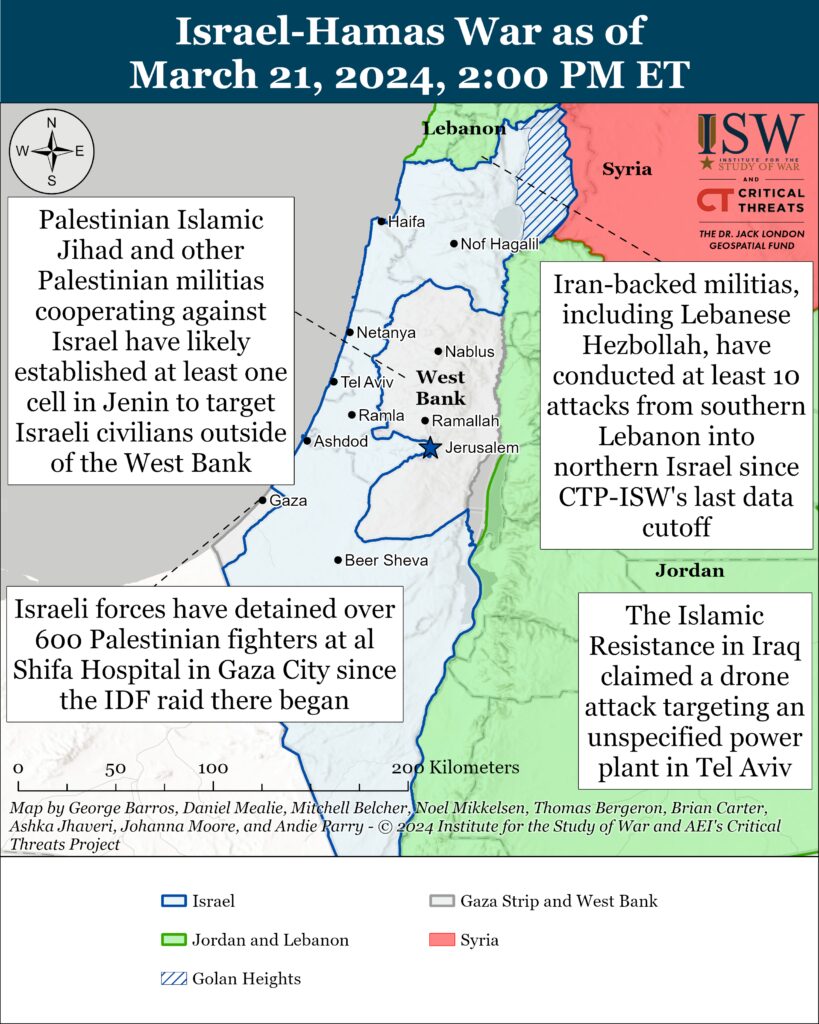
Gaza Strip
Axis of Resistance campaign objectives:
Erode the will of the Israeli political establishment and public to launch and sustain a major ground operation into the Gaza Strip
Degrade IDF material and morale around the Gaza Strip.The IDF Nahal Brigade (162nd Division) continued clearing operations in the central Gaza Strip on March 21. Israeli forces killed about 20 Palestinian fighters in the central Gaza Strip.[xxxiii] Palestinian sources reported that Israeli forces at the Netzarim checkpoint killed two Palestinians attempting to enter Gaza City from the southern Gaza Strip.[xxxiv] PIJ targeted Israeli personnel near the Israel-built highway that divides the northern and southern Gaza Strip.[xxxv] Other Palestinian militias claimed rocket and mortar attacks on Israeli positions in the eastern of the central Gaza Strip.[xxxvi]
Israeli forces began an operation to clear new areas of Qarara, northern Khan Younis, on March 21. The IDF 7th Brigade (36th Division) killed Palestinian fighters in the area and destroyed military infrastructure, including rocket launch shafts.[xxxvii] Israeli forces conducted waves of airstrikes on Qarara as part of the operation.[xxxviii] Israeli forces have been operating in Qarara since March 3.[xxxix] PIJ fighters targeted Israeli infantrymen breaching a tunnel in Qarara on March 21 by rigging the tunnel entrance to explode.[xl] Hamas fighters targeted two Israeli tanks with rocket-propelled grenades west of Qarara.[xli]
The IDF released a summary of the IDF 89th Commando Brigade’s clearing operation in Hamad on March 21. Israeli forces concluded clearing operations in Hamad, northern Khan Younis, on March 19.[xlii] Israeli special operations forces raided 100 buildings, killed “dozens” of Palestinian fighters, and seized weapons during the two-week clearing operation.[xliii] Israeli intelligence is questioning dozens of Palestinian fighters detained in Hamad. A Palestinian journalist posted a video from Hamad on March 21 showing empty streets and buildings with no IDF vehicles or personnel, indicating that the IDF is no longer operating in Hamad.[xliv]
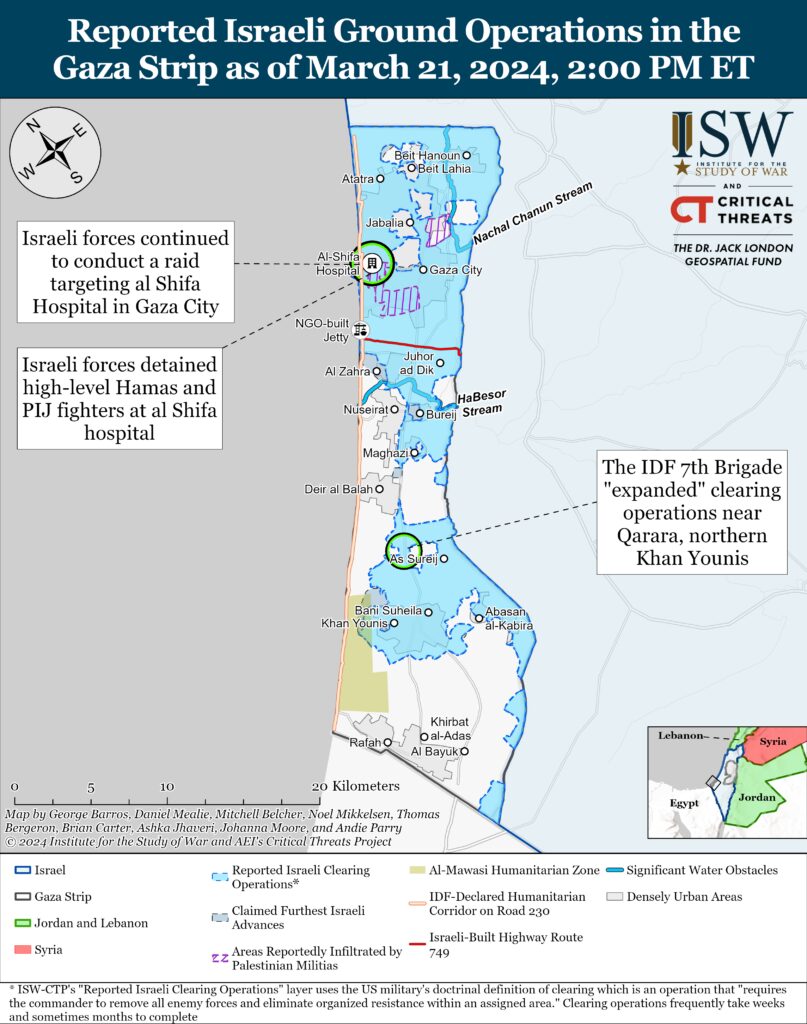
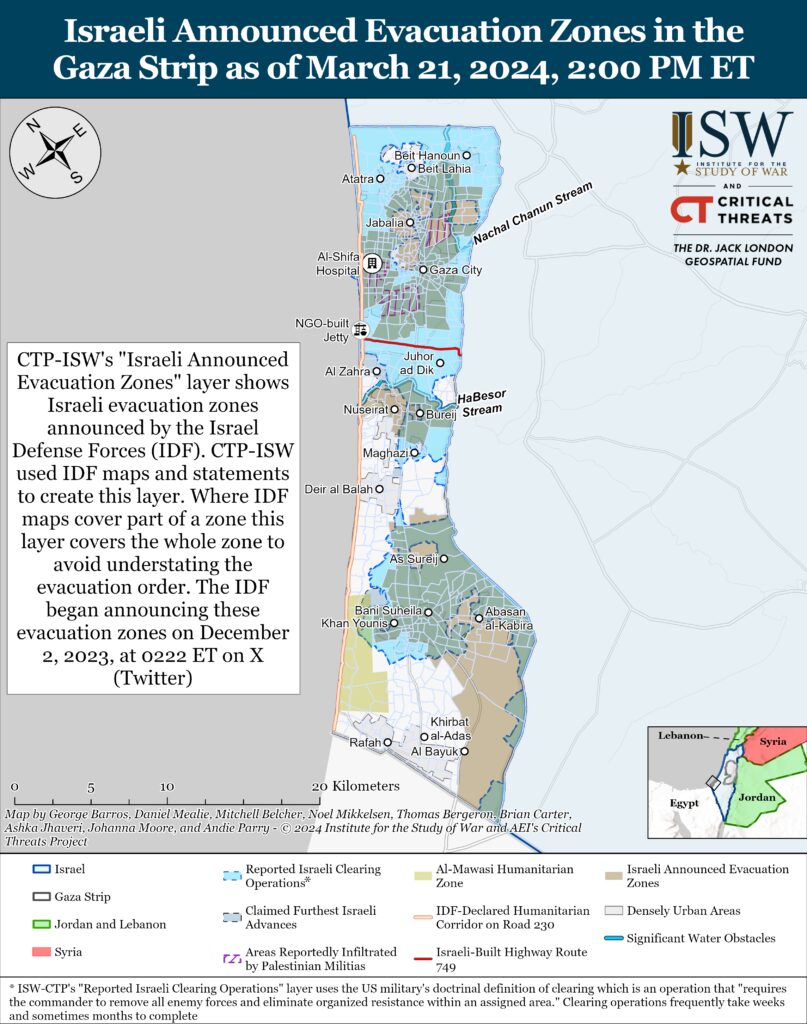
Mossad Director David Barnea, the lead Israeli official responsible for ceasefire and hostage negotiations, is expected to return to Qatar on March 22 to meet with high-level US, Egyptian and Qatari officials, according to the Israeli Prime Minister’s Office.[xlv] Barnea departed Qatar on March 19.[xlvi]
PIJ and the Popular Front for the Liberation of Palestine (PFLP) fired rockets from the Gaza Strip at Beeri, southern Israel, on March 21.[xlvii]
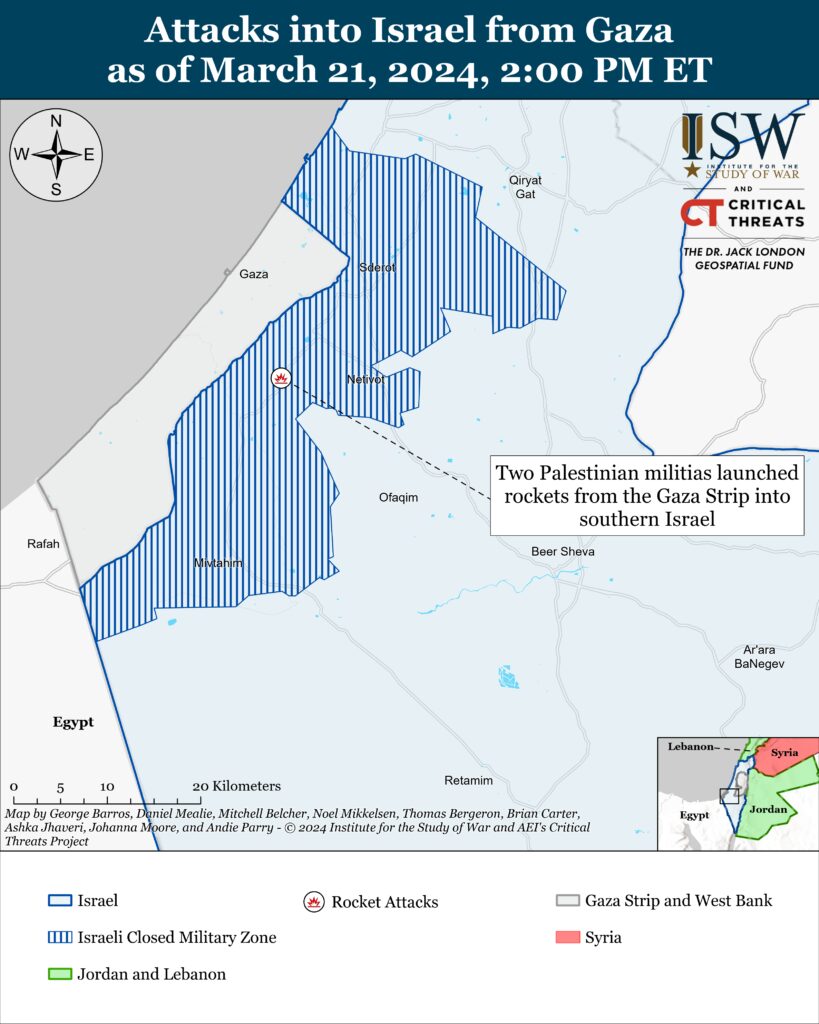
Recorded reports of attacks; CTP-ISW cannot independently verify impact.
West Bank
Axis of Resistance campaign objectives:
Draw IDF assets and resources toward the West Bank and fix them thereIsraeli forces have clashed with Palestinian fighters in at least nine locations in the West Bank since CTP-ISW’s last data cutoff on March 20.[xlviii]
PIJ, Hamas, and the al Aqsa Martyrs’ Brigades attempted to disrupt a major Israeli raid in Nour Shams, near Tulkarm, on March 21. Hamas acknowledged that at least one of the Palestinian fighters killed during the Israeli operation was a Hamas member.[xlix] Both PIJ and the al Aqsa Martyrs’ Brigades detonated IEDs and fired small arms targeting Israeli forces during the Israeli operation in Nour Shams.[l] The IDF said that it completed a “brigade-level counter terrorism mission” in Nour Shams, near Tulkarm on March 21.[li] The IDF arrested three wanted individuals, uncovered planted IEDs, and killed two unspecified Palestinian fighters during a small arms clash during the operation.[lii] The IDF Air Force conducted an airstrike that killed two other Palestinian fighters who were throwing IEDs at Israeli forces operating in Nour Shams.[liii]
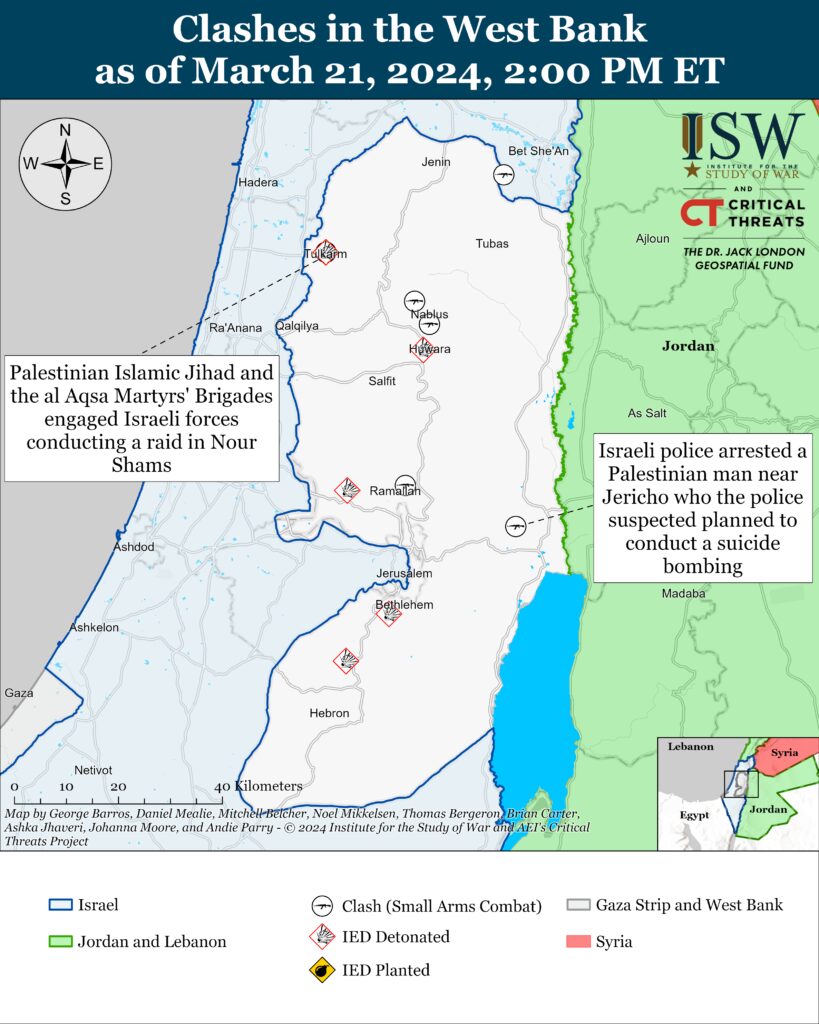
This map is not an exhaustive depiction of clashes and demonstrations in the West Bank.
Southern Lebanon and Golan Heights
Axis of Resistance campaign objectives:
Draw IDF assets and resources toward northern Israel and fix them there
Set conditions for successive campaigns into northern IsraelIran-backed militias, including Lebanese Hezbollah, have conducted at least 10 attacks from southern Lebanon into northern Israel since CTP-ISW’s last data cutoff on March 20.[liv]
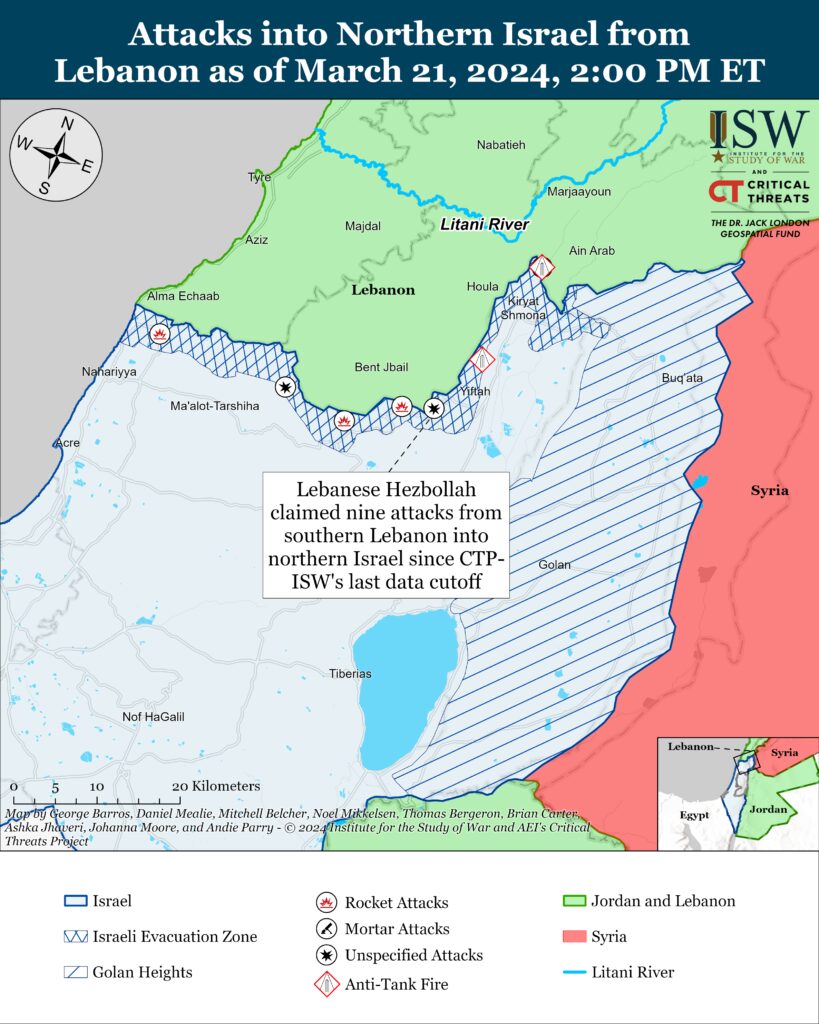
Recorded reports of attacks; CTP-ISW cannot independently verify impact.
Iran and Axis of Resistance
Axis of Resistance campaign objectives:
Demonstrate the capability and willingness of Iran and the Axis of Resistance to escalate against the United States and Israel on multiple fronts
Set conditions to fight a regional war on multiple frontsThe Islamic Resistance in Iraq—a coalition of Iranian-backed Iraqi militias—claimed a drone attack targeting an unspecified power plant in Tel Aviv on March 21.[lv] CTP-ISW cannot verify this claim. The IDF did not report any suspicious drone activity near Tel Aviv.
Kataib Sayyid al Shuhada Secretary General Abu Ala al Walai described Israeli maritime ports and airports as “legitimate targets” on March 21.[lvi] Walai claimed that Kataib Sayyid al Shuhada will continue to conduct attacks targeting Israel until Israel “stops [its] aggression” and “lifts [its] siege” on Palestinians in the Gaza Strip. Walai called in late January 2024 for Iranian-backed Iraqi militias to launch a “second phase” of operations against the United States and Israel.[lvii] Walai specified that this phase would involve blocking Israeli maritime activity in the Mediterranean Sea and rendering Israeli ports inoperable. The Islamic Resistance in Iraq, a coalition of Iranian-backed Iraqi militias that Kataib Sayyid al Shuhada is a member of, has claimed six attacks targeting Israeli airports and IDF airbases and one attack targeting an Israeli maritime port since February 4.[lviii] The IDF has not corroborated these claims.
The Iraqi State Company for Iron and Steel’s Director General Abbas Hayal announced on March 17 that the Iraqi federal government plans to sign a contract with an unspecified “major Chinese company” to construct a steel plant in Basra, Iraq.[lix] Hayal said that an Iraqi delegation led by the Iraqi industry and minerals minister recently traveled to China to visit the company’s headquarters. Hayal also said that the Iraqi federal government has granted the Chinese company three square kilometers of land to set up a “large industrial city” in Basra Province to produce steel and other metals.[lx] Hayal is reportedly a member of the Islamic Dawa Party, which is headed by former Prime Minister Nouri al Maliki.[lxi] Iraqi authorities previously arrested Hayal in April 2021 on corruption charges.[lxii]
The US Treasury Office of Foreign Assets Control (OFAC) sanctioned three procurement networks across four different countries on March 20 for supporting Iran’s ballistic missile, nuclear, and defense programs.[lxiii] OFAC sanctioned companies and individuals based in Germany, Oman, Turkey, and Iran.
A German Navy helicopter operating as part of the European-led Operation Aspides intercepted a Houthi naval attack drone in the Red Sea on March 21 that was targeting the German frigate Hessen.[lxiv] The Hessen previously shot down two Houthi one-way attack drones over the Red Sea on February 27.[lxv] Aspides is the defensive European naval coalition operating in the Red Sea.[lxvi]
A French frigate operating as part of Operation Aspides intercepted three Houthi ballistic missiles over the southern Red Sea on March 21.[lxvii] The French frigate was accompanying an unspecified merchant vessel in the area. The General Staff of the French Armed Forces said that the attack posed a direct threat to the freedom of navigation.[lxviii]
US CENTCOM intercepted a Houthi naval attack drone and Houthi aerial one-way attack drone over the Red Sea on March 20.[lxix] CENTCOM said that the attacks did not cause any damage to US or coalition ships. The Houthis have not claimed responsibility for the attacks at the time of writing.
The IDF intercepted a “suspicious aerial target” over the Red Sea on March 21.[lxx] The IDF said that the target was heading toward Israel but did not cross into Israeli territory. Israeli media reported that the IDF intercepted the target off the coast of Eilat in southern Israel.[lxxi]
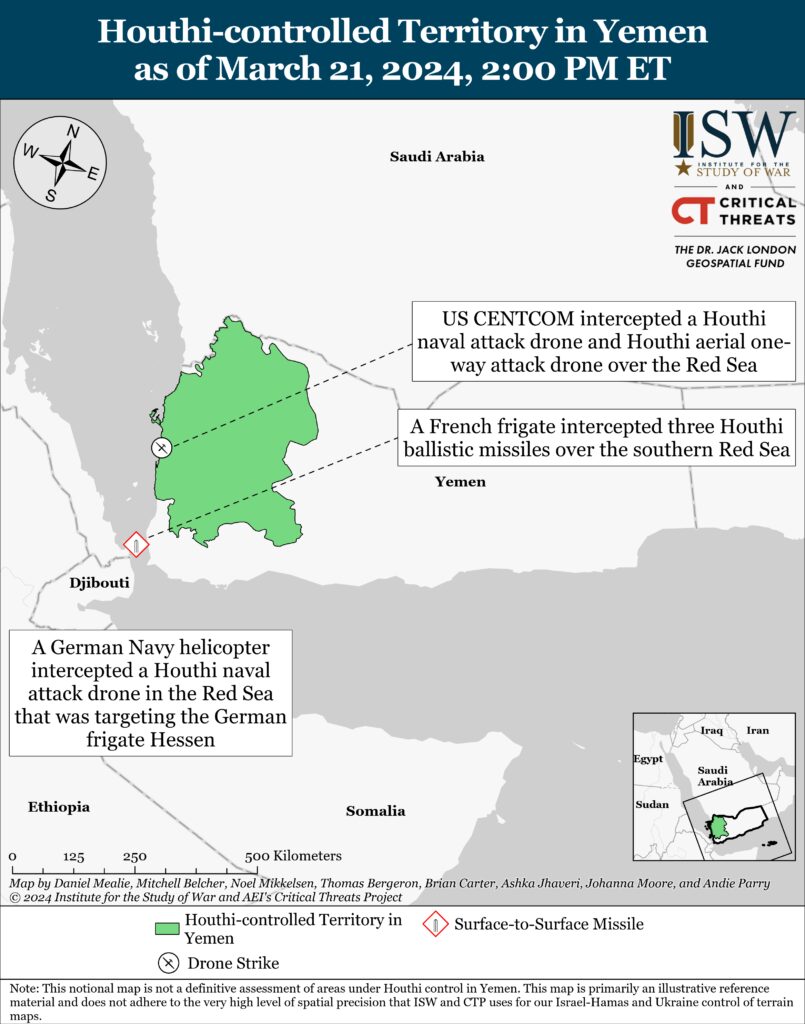
 Eurasia Press & News
Eurasia Press & News
